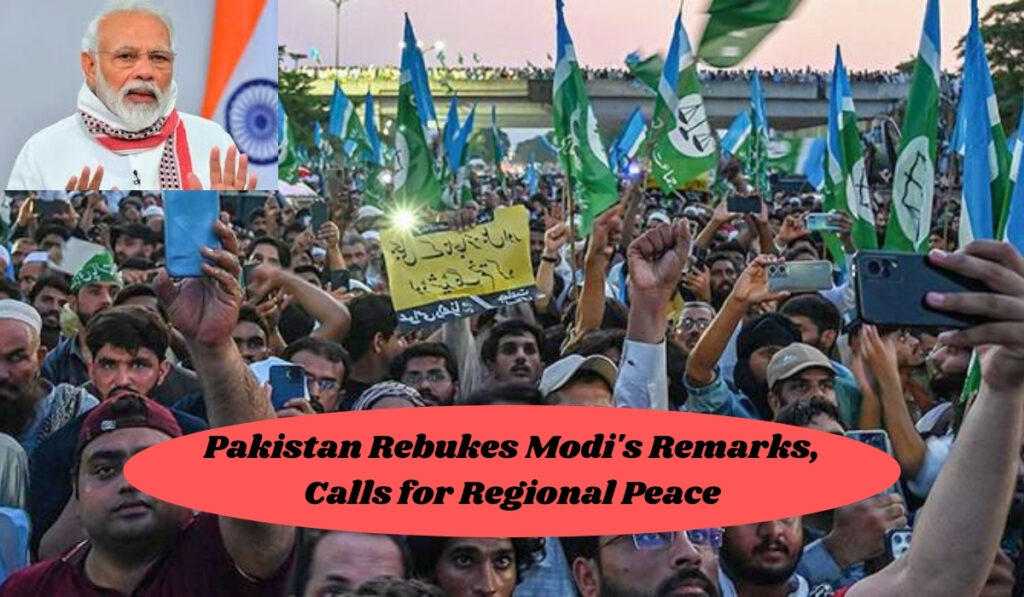Introduction
In a recent escalation of verbal tensions, Pakistan has firmly rebuffed Indian Prime Minister Narendra Modi’s remarks, describing them as “belligerent” and “totally counter-productive.” Pakistan’s Foreign Office highlighted India’s own contentious activities and reiterated the importance of resolving disputes through peaceful means. This article delves into the details of this diplomatic exchange, the historical context of the relationship of both the countries, and the ongoing issues in the region.
Modi’s Remarks and Pakistan’s Response
Modi’s Accusations
During an event, Prime Minister Narendra Modi accused Pakistan of trying to maintain relevance through “terrorism” and “proxy war.” He asserted that these tactics would not succeed, framing Pakistan as a perpetrator of regional instability.
Pakistan’s Rebuttal
Pakistan’s Foreign Office, represented by Spokesperson Mumtaz Zahra Baloch, issued a statement refuting Modi’s allegations. The statement emphasized that such rhetoric undermines regional peace and is counter-productive to resolving long-standing disputes, particularly the core issue of Jammu and Kashmir.
“Bravado and jingoism undermine regional peace and are totally counter-productive for resolution of long-standing disputes between both the countries, especially the core dispute of Jammu and Kashmir.”
Highlighting India’s Actions
The Foreign Office further criticized India’s heavy-handed approach in the Indian Illegally Occupied Jammu and Kashmir (IIOJK), accusing Indian forces of committing brutalities against the Kashmiri people. The statement stressed that India’s aggressive policies and rhetorical statements cannot distract from the international community’s awareness of these issues.
“The Indian leaders’ rhetorical statements cannot deflect international attention from India’s heavy-handed approach to suppress the Kashmiri people’s just struggle for the realization of their fundamental rights and freedoms, particularly their inalienable right to self-determination.”
Historical Context of India-Pakistan Relations
Roots of the Conflict
The roots of both countries’ conflict can be traced back to the partition of British India in 1947, which led to the creation of two separate nations: India and Pakistan. The partition was accompanied by massive communal violence and the displacement of millions. Since then, the two countries have fought several wars and engaged in numerous skirmishes, with the most contentious issue being the status of Jammu and Kashmir.
The Kashmir Dispute
Jammu and Kashmir, a region claimed by both countries, has been a flashpoint for conflict since 1947. The region is currently divided between India-administered Jammu and Kashmir and Pakistan-administered Azad Jammu and Kashmir. The dispute over this territory has fueled tensions and violence, including insurgencies and cross-border skirmishes.
Diplomatic Relations
Over the decades, India and Pakistan have experienced fluctuating diplomatic relations, marked by periods of dialogue and cooperation interspersed with times of heightened tension and conflict. The relationship took a significant downturn in August 2019, when India revoked the special status of Jammu and Kashmir, leading to a severe diplomatic fallout.
Pakistan’s Stance on Regional Peace
Commitment to Peace
Despite the ongoing tensions, Pakistan has reiterated its commitment to promoting peace and stability in the region. The Foreign Office statement highlighted Pakistan’s intent and ability to safeguard its sovereignty, referencing the robust response to India’s incursion in February 2019 as an example of its resolve.
“Pakistan stands resolute in its intent and ability to safeguard its sovereignty, as exemplified by its robust response to India’s reckless incursion in February 2019.”
Call for Reflective Action
Pakistan also called on India to reflect on its own actions, including orchestrating targeted assassinations, subversion, and terrorism in foreign territories. The statement urged the Modi-led regime to avoid maligning others for terrorism and to focus on resolving disputes through peaceful means.
“Islamabad called on New Delhi to reflect on its own campaign of orchestrating targeted assassinations, subversion, and terrorism in foreign territories and asked the Modi-led regime to avoid maligning others for terrorism.”
Current State of Affairs
Diplomatic Stalemate
India-Pakistan relations have remained largely frozen since August 2019, following India’s decision to revoke the special status of Jammu and Kashmir and reconstitute the region into two federally administered territories. This move led to a significant downgrading of diplomatic ties, with both countries taking tit-for-tat measures.
International Perspective
The worldwide local area keeps on observing the circumstance intently, with different nations and associations calling for limitation and discourse. The ongoing conflict in Kashmir and the broader regional instability pose significant challenges to peace and security in South Asia.
Conclusion
The recent exchange of accusations between Pakistan and India highlights the enduring and complex nature of their relationship. While Prime Minister Modi’s remarks have been met with strong rebuttals from Pakistan, the underlying issues remain unresolved. Both countries must seek to address their differences through dialogue and peaceful means to ensure regional stability and prosperity. The international community’s role in facilitating this dialogue and advocating for human rights and self-determination in disputed regions like Jammu and Kashmir remains crucial.
References
By addressing these issues in detail and maintaining a commitment to peace, both India and Pakistan can work towards a more stable and prosperous future for their people.

